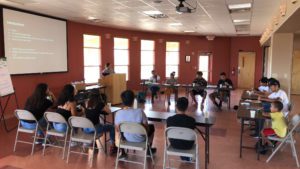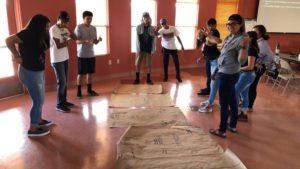By Natisha Toya
 While interning at CSVANW, I learned about violence, abuse, and how to break these harmful cycles. Through learning and gaining experience, I realized that many of the behaviors I learned and live by may be harmful or abusive in some ways. This was the first step to breaking cycles of violence in my own life. Later, I made the connection that within Indigenous communities our knowledge about healthy relationships and consent may not always be present. In my own experience, there are many things that aren’t talked about, especially not relationships. I was taught about partnerships based on what I saw and did not question it. I quickly realized that if I had these thoughts, others in my community might as well.
While interning at CSVANW, I learned about violence, abuse, and how to break these harmful cycles. Through learning and gaining experience, I realized that many of the behaviors I learned and live by may be harmful or abusive in some ways. This was the first step to breaking cycles of violence in my own life. Later, I made the connection that within Indigenous communities our knowledge about healthy relationships and consent may not always be present. In my own experience, there are many things that aren’t talked about, especially not relationships. I was taught about partnerships based on what I saw and did not question it. I quickly realized that if I had these thoughts, others in my community might as well.
At CSVANW, my advisor was Keioshiah Peter, who is the Native Youth Coordinator. Many presentations of theirs were about the topics I was learning more about. When sharing my personal experience with them, we decided that my major project for this internship would comprise of educating youth on these topics. We shared a workshop with Native American Youth Empowerment, (NAYE) which is a youth council based in the Pueblo of Jemez. I had been actively involved with this youth group since I was 13 years old, so presenting to my peers provided me an opportunity to showcase my research.
The main goal of this event was to educate NAYE on healthy relationships, abuse, consent, taking care of the land while also incorporating self-care.
First, we talked about land and how our connection to the land is important as Indigenous peoples. Keioshiah even dropped some Dine knowledge about fingerprints and how features of ourselves can be seen in the land. As Indigenous people our identity is deeply rooted in the land we come from. Our ancestors have passed on the teaching that all things that come from the land are sacred. Our connection to the land is sacred. If the connection is broken, we become detached from ourselves and our ancestors. We must protect our environment and resources in order for future generations to be sustained. In order for us to grow and protect our environment, we must know how violence, oppression, and abuse affect our land and our people. 
During this workshop, we talked about five different types of abuse which included physical, verbal, mental, cyber/digital, and sexual abuse. We talked in depth about each type and gave examples of each. Many of the behaviors mentioned are normalized, so much that many of the group members did not know they were practicing harmful acts. One example that many did not know can be abusive is demanding passwords and looking through electronic devices. Many may think that this is a way to gain trust, however it can also be used to control and intimidate. These types of abuse can be correlated to our land as well.
In today’s world, we seek to domesticate our land. The way we do this is by trying to control and intimate the land and making it to fit our own wants/needs. There are ways we can do this in a healthy way, which is how our ancestors took care of our territories through love, consent, and respect.
There are unhealthy ways, such as polluting the soil and water. The key point for our relationship with the land is “what happens to our land also happens to our people.” Having a healthy relationship with the land will then help our relationships with ourselves and other people. An example we used was when our land gets polluted or we see violence happening to our land, it affects our mental health and even our physical health. Us, like the plants, cannot grow if our soil is not sustainable. We also concluded that violence to our land is violence to our people.
 This workshop included a body mapping activity, which asks participants to think about their own connections to the land. It was heartwarming to see what the members of the youth group wrote. Many of the answers to the question about what keeps them grounded were deeply rooted in their Indigenous identity. For example, traditional dances, customs, food and praying were common answers. They also stated that they wanted to take what they learned from the event to help protect the land. Some wanted to educate others and be role models for protecting the land as well as others in our community.
This workshop included a body mapping activity, which asks participants to think about their own connections to the land. It was heartwarming to see what the members of the youth group wrote. Many of the answers to the question about what keeps them grounded were deeply rooted in their Indigenous identity. For example, traditional dances, customs, food and praying were common answers. They also stated that they wanted to take what they learned from the event to help protect the land. Some wanted to educate others and be role models for protecting the land as well as others in our community.
After the healthy relationships workshop was done, attendees were asked to write a love letter and answer questions how the event went. Their feedback was very insightful. Many of the major points in the presentation were received by them, like what is consent and consent laws, protecting the land, abuse and how this is all connected to having a healthy relationships.